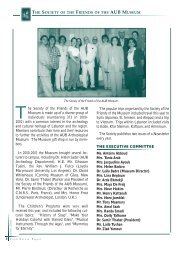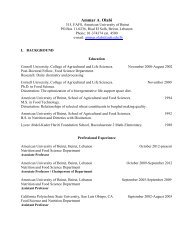The IX t h Makassed Medical Congress - American University of Beirut
The IX t h Makassed Medical Congress - American University of Beirut
The IX t h Makassed Medical Congress - American University of Beirut
You also want an ePaper? Increase the reach of your titles
YUMPU automatically turns print PDFs into web optimized ePapers that Google loves.
T h e I X t h M a k a s e d M e d i c a l C o n g r e s s<br />
Conclusion: In our preliminary group, SVR may afford significant improvement <strong>of</strong> symptoms and<br />
ejection fraction, and that the procedure can be performed safely. Further studies are needed<br />
to define the patients best served with the procedure,<br />
Stich trial is not the final answer to SVR.<br />
EVOLUTION OF INTERVENTIONAL CARDIOLOGY<br />
Spencer B. King, III, M.D., M.A.C.C.<br />
Interventional cardiology evolved from concepts created in the disciplines <strong>of</strong> surgery, radiology<br />
and cardiology. <strong>The</strong> pivotal developments <strong>of</strong> radiographic imaging enabled the development<br />
<strong>of</strong> coronary arteriography which facilitated coronary bypass surgery and the dilatation <strong>of</strong> vessels<br />
was a peripheral procedure developed to improve claudication.<br />
All <strong>of</strong> these elements were integrated by the father <strong>of</strong> interventional cardiology, Andreas<br />
Gruentzig. From the earliest experiments <strong>of</strong> vascular dilatation to the clinical application <strong>of</strong><br />
coronary angioplasty, the development <strong>of</strong> steerable guidewire techniques, the introduction <strong>of</strong><br />
coronary stents, and the control <strong>of</strong> restenosis, interventional cardiology has been at the forefront<br />
<strong>of</strong> modern medical evolution. No other specialty has created so many areas <strong>of</strong> research interests<br />
or performed as many clinical trials to establish the effectiveness <strong>of</strong> those interventions.<br />
<strong>The</strong> technologic developments have been dramatic and now have their greatest potential in<br />
managing structural heart disease. As we pass 33 years <strong>of</strong> interventional cardiology, the disciplines<br />
that were necessary for its foundation are reuniting to move developments forward.<br />
<strong>The</strong> recently published guidelines <strong>of</strong> the European Society <strong>of</strong> Cardiology were developed by<br />
cardiologists and cardiac surgeons working in tandem. <strong>The</strong> evolution has been dramatic but the<br />
future looks even more promising.<br />
TREATMENT OF STABLE ISCHEMIC HEART DISEASE<br />
Spencer B. King, III, M.D., M.A.C.C.<br />
Ischemic heart disease comes in various forms and is most feared when it is acute and abrupt.<br />
<strong>The</strong> occurrence <strong>of</strong> myocardial infarction is <strong>of</strong>ten life-threatening and its’ treatment has been the<br />
most important success story for interventional cardiology.<br />
Cardiac surgery demonstrated the ability to manage highly symptomatic ischemic heart<br />
disease, albeit through significantly invasive methods. Now interventional cardiology’s role in<br />
the management <strong>of</strong> stable ischemic heart disease is being questioned. Whereas a mortality<br />
benefit is clearly demonstrated in the patients presenting with acute coronary events, studies to<br />
date have not demonstrated a comparable result for patients with stable conditions. Because<br />
<strong>of</strong> that many advocate the use <strong>of</strong> revascularization primarily for symptomatic relief, and indeed,<br />
revascularization is the most effective method for alleviating symptoms due to ischemic heart<br />
disease. <strong>The</strong> two questions being asked are whether revascularization should be performed at<br />
all in patients with stable ischemic heart disease, and, if revascularization is to be performed,<br />
which method, i.e. percutaneous coronary intervention or coronary bypass surgery, should be<br />
employed.<br />
80
















